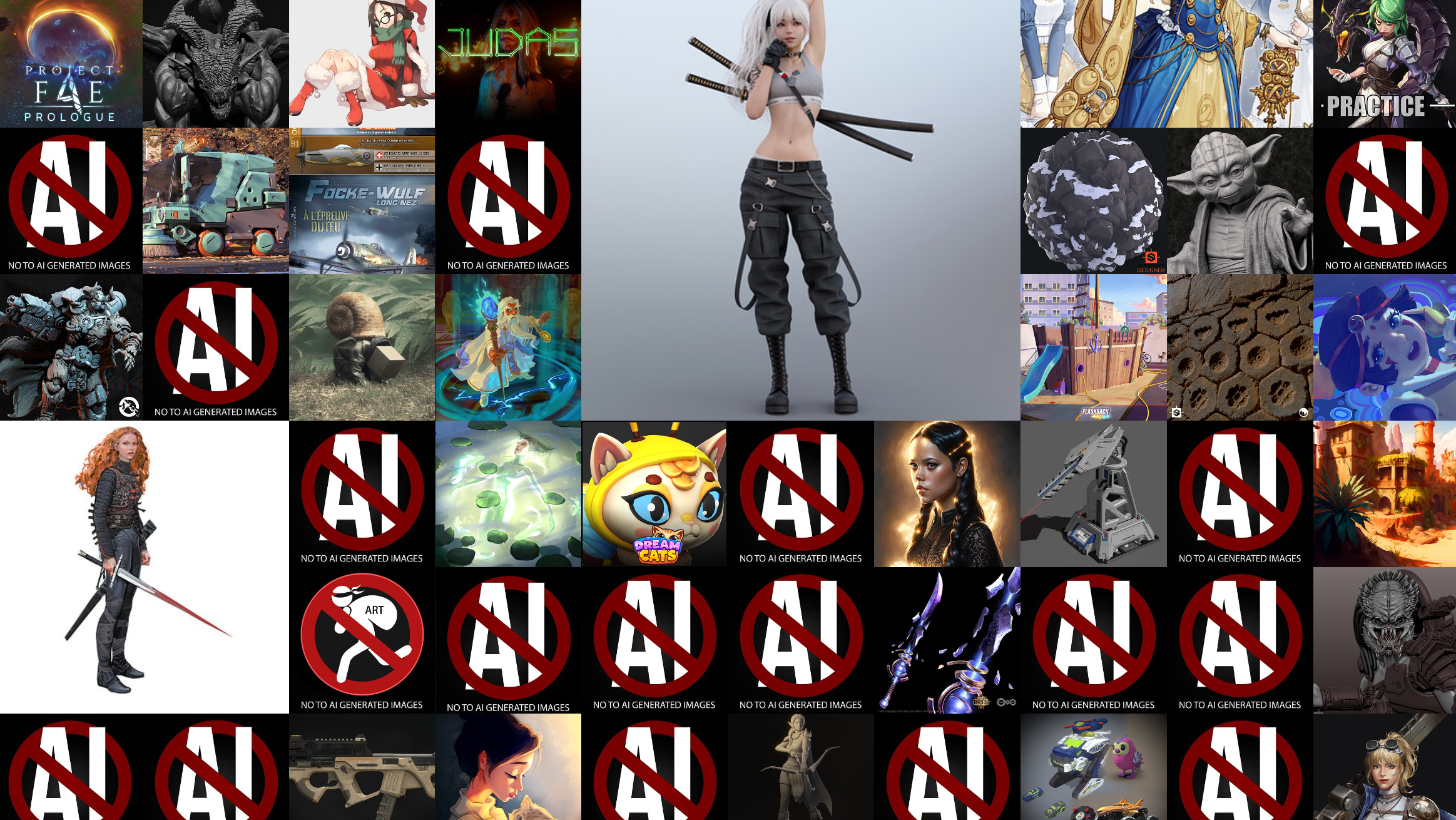World's biggest art portfolio site embroiled in user protest against AI art
Human artists are angry about the flood of AI art being mixed with their own work.

Artists rarely agree on much but, at the moment, a big chunk of them are angry about AI art. Not necessarily the concept, nor even its almost inevitable commercial use, but at the way it has suddenly appeared and flooded the internet's various artistic watering holes. The biggest by far is ArtStation, owned by Epic Games, which is a site where artists share pictures, create a portfolio, and network with other artists.
This week has seen frustrations against the site boil over, following what seemed to be a deluge of AI-created art and the site's inability or unwillingness to address it. An image created by Alexander Nanitchkov became the focal point of the protests, which has been reproduced in countless variants but most often in its basic form: a crossed-out "AI" logo, with the text "Say no to AI generated images" below.
There are other images but this is the one that artists decided en masse to adopt, with so many posting the image that it threatened to take over the ArtStation homepage entirely. As things stand it remains prevalent on the homepage but at one point things looked like this:
keep it rolling #artstation #AI #art pic.twitter.com/hA5lppVFnFDecember 14, 2022
"ArtStation’s content guidelines do not prohibit the use of AI tools in the process of creating artwork that is shared with the community," said an Epic spokesperson to Kotaku. "That said, ArtStation is a portfolio platform designed to elevate and celebrate originality powered by a community of artists. Users’ portfolios should only feature artwork that they create, and we encourage users to be transparent in the process."
Epic went on to add that it is apparently "in the process of giving ArtStation users more control over how their work is shared and labeled, and we will provide more details in the near future."
This seems somewhat reasonable: the question of how AI art is going to fit into the art world's future is surely more complex than "let's ban it" and, at the same time, it seems reasonable to insist on firm and up-front delineations between what humans create and what software produces. However, ArtStation itself then put its foot right in it with a new FAQ.
The replies to that certainly suggest ArtStation got something wrong, and the FAQ has infuriated some users. The simple request that “I would like to ratio ArtStation” is the current top reply, with 14.6K likes.
The biggest gaming news, reviews and hardware deals
Keep up to date with the most important stories and the best deals, as picked by the PC Gamer team.
A particular bugbear is the line that ArtStation does not wish to be "a gatekeeper with site terms that stifle AI research and commercialization when it respects artists’ choices and copyright law", which critics feel is putting the act of AI creation on an undeserved footing with human creation.
ArtStation's statement goes on to say that it'll be introducing tags to allow artists to disallow the use of their work for AI training, but that it won't add any of these tags by default: so very much an "opt out" system. A request for feedback on the "rapidly evolving" issue resulted in a lot of feedback, some of it in all-caps, while other users deleted their accounts in protest.
At the time of writing ArtStation has made no further public comment, but the anti-AI images continue to flood its front page. Hey, at this rate, the AI software itself should be producing them by next week.

Rich is a games journalist with 15 years' experience, beginning his career on Edge magazine before working for a wide range of outlets, including Ars Technica, Eurogamer, GamesRadar+, Gamespot, the Guardian, IGN, the New Statesman, Polygon, and Vice. He was the editor of Kotaku UK, the UK arm of Kotaku, for three years before joining PC Gamer. He is the author of a Brief History of Video Games, a full history of the medium, which the Midwest Book Review described as "[a] must-read for serious minded game historians and curious video game connoisseurs alike."

